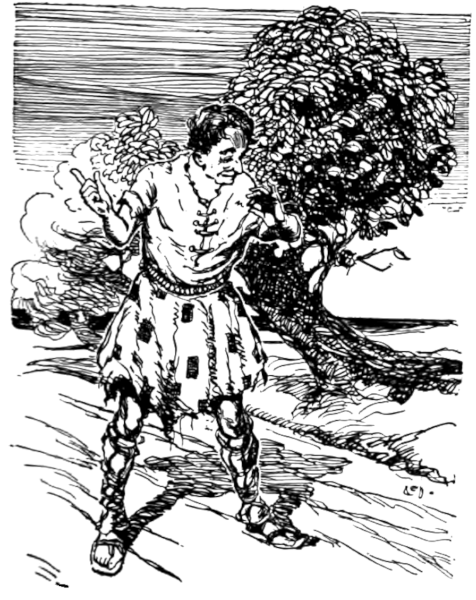| Web
and Book design,
Copyright, Kellscraft Studio 1999-2024
(Return
to Web
Text-ures)
| Click
Here to return to The Elm Tree Fairy Book Content Page Return to the Previous Chapter |
 (HOME)
|
|
THE
PEA THAT WON A PRINCESS
ONCE upon a time there was a poor man named Pentecles. As he
was walking along the road one day he found a pea, and he said to himself,
"I will plant this pea, and it will grow up and blossom and the vine will
soon hang full of pods. When the peas are ripe I will pick them, and instead of
one pea I shall then have many. But I will neither eat nor sell them. No, I
will save every one and plant them, and they too will increase. I will again
plant all I pick, and I will keep on planting and harvesting in the same
manner. Thus, in time, I shall have enough peas to lade some great ships with
them — perhaps even the twelve ships of the king." With this thought in his head he went and presented himself
before the king and asked him for his twelve ships to carry cargoes to a
foreign port. "What is it you have to lade the ships with?" asked the
king. "Peas," replied the man, "peas all of my own
raising." He forgot he had as yet only the one pea he had found by the
roadside, and that many years must pass before he could possibly fill twelve
such great ships as those of the king with his peas. The king thought over the request Pentecles had made and
said to himself, "This man must be very wealthy. The peas alone are worth
a fortune, and what vast estates he must possess to raise so great a
quantity!" The words of the young man made a deep impression on him,
and addressing him he said, "Would you not like to marry?" "Why, yes," replied Pentecles, "if I could
find the right sort of person for a wife."
"I have a daughter whom I think worthy of you,"
said the king. Pentecles was afraid he would get himself into trouble if he
married the princess, but he did not like to refuse the king's offer lest the
king should be angry and not let him have the twelve ships. "Ah!" said the king, "you hesitate. You can
do as you please. Will you take my daughter or not?" Pentecles thought he had better say, "Yes," and
see how things would turn out. When he had consented, the king ordered apartments made
ready for him in the palace, and, to assure himself that the man was really
rich, directed a servant to put ragged sheets and a torn coverlet on the man's
bed. "And I want you to stay all night on watch," said the king,
"to see whether he sleeps or not. If he is used to such a bed he will
sleep well and I shall know that he is poor and has deceived me. But if he is
wakeful, that will show that he is rich and has been accustomed to perfect
bedclothes and cannot sleep on rags." At length bedtime came, and Pentecles retired to his chamber
and got into the ragged bed. The next morning the servant told the king that
the young man had been restless the whole night through, and he doubted if he
slept at all. "Well," said the king, "that looks as if he
was as rich as I suppose him to be. Now, for to-night, make up the bed properly
with the best and most comfortable bedclothes in the palace and see what
happens." The bed was prepared according to the king's orders, and the
servant watched as before. He reported the following morning that Pentecles had
slept soundly the entire night. "Very good!" exclaimed the king.
"I thought from the first he was all right, and I only wanted to make
sure. We must begin preparations for the wedding at once." But the king's test had not been as certain as he believed
it to be. The young man had taken the pea into bed with him, for the pea was
his greatest treasure on which his future fortune and the lading of the twelve
great ships depended. He was so anxious about the pea that the first night he
could not sleep for fear it might get lost in the ragged bedclothes. He had no
such fear the second night, and therefore slept as sound as could be. However, as the king knew nothing of this he was satisfied,
and the wedding took place. When Pentecles explained to the king later wherein
his wealth consisted, the king was inclined to grumble, but what was done could
not be undone, and he made the best of the matter. After all, this son-in-law
might, by pursuing the plan he had formed for increasing the peas, at length
have as many as he imagined he would have. So the king gave him land and he planted the pea and he
raised more and more as the years passed, but I believe he never succeeded in
raising enough to fill the twelve great ships of the king. |
